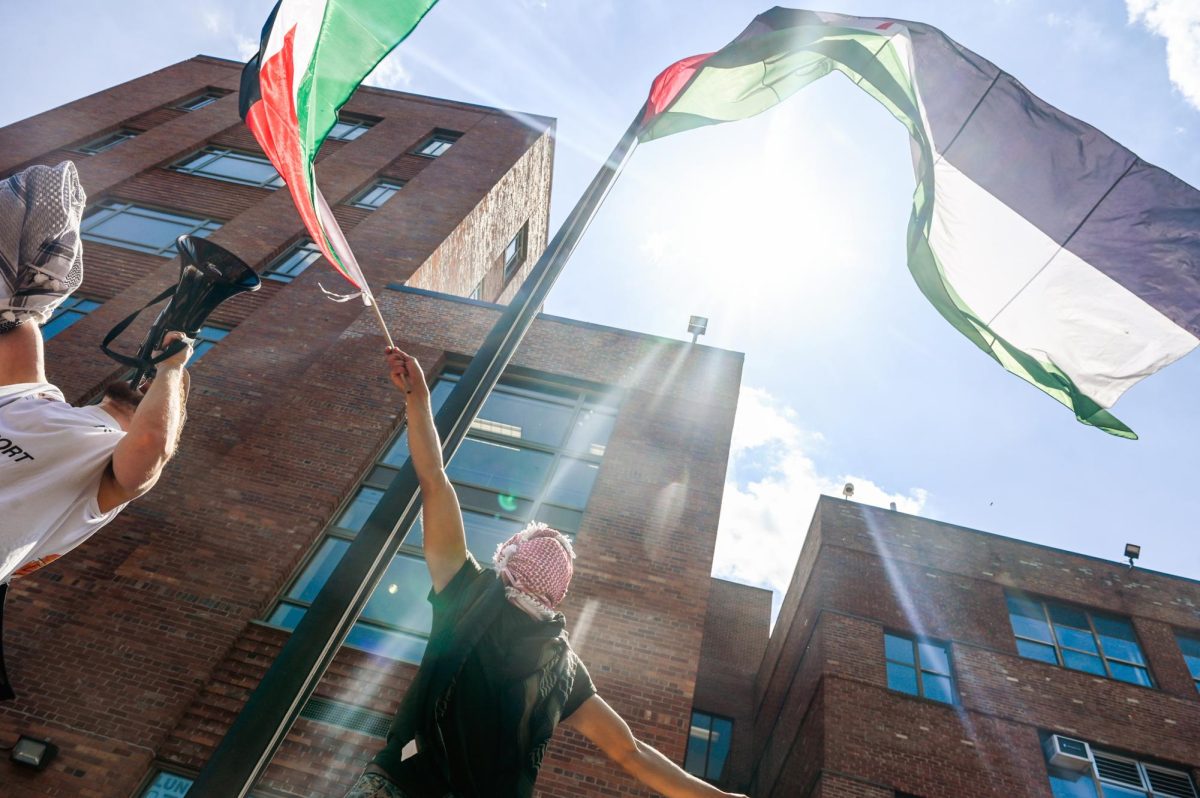As the leader of the University’s largest college nears the end of a deanship that added full-time faculty and research funding, she will work against a groundswell of faculty disapproval that multiple professors and department heads say could stall progress for the school.
A half-dozen current or former department chairs in the Columbian College of Arts and Sciences said disapproval could hang over Peg Barratt’s head this year, as she works with faculty who know she has just eight months left in her term.
“When a leader is a lame duck, it just is harder,” one department chair said. “It’s really tough when people know your time is limited. She’s been a controversial figure to some.”
Richard Robin, director of the Russian Language program, predicted the school would be “in standstill mode” as Barratt works around faculty whose support she has lost. Faculty criticized Barratt in a survey last spring, saying she was out of touch and lacked a clear vision for the school.
“She took away enough from enough programs to get enough people mad at her,” said Robin.
But Senior Vice Provost for Academic Affairs and Planning Forrest Maltzman said he thought Barratt would continue to launch programs, make hiring decisions and successfully fundraise in her last year.
“In the United States presidency, you have a ‘lame duck’ period. I don’t think a deanship is like that. We’ve seen a lot of deans accomplish things up to their last minute in office,” Maltzman, a political scientist, said. “You know, Dean Barratt has lots of goals, and I have no doubts that she’ll accomplish them this year.”
Barratt said she will “stay the course” for the remainder of her tenure, working with the school’s wide range of disciplines, building up an arts initiative that will bring more outside artists to GW and improving the college’s English as a second language programs. Barratt, like other deans at GW, also spends 40 percent of her time courting donors to increase fundraising.
But one major initiative could help focus the snapshot of her up-and-down five-year tenure. Barratt will lay the groundwork this year for an undergraduate economics program, where 50 students will spend two years in D.C. and one year each in France and China, by fall 2014.
She said she will travel this fall to hammer out the details with the University’s partner schools in the global degree program – Sciences Po in France and Renmin University in Suzhou, China this fall.
The program will likely include 30 to 50 students, and recruitment will begin in the spring, Barratt said.
“This will bootstrap us to be playing with the big players in each of these other countries. That’s what [Columbian College] has been leading, but the University as a whole is doing it too,” she said.
Barratt, hired away from the National Institutes of Health by former University President Stephen Joel Trachtenberg in 2007, has made strides for the college since her arrival. The number of full-time faculty has risen 8.5 percent, and external research dollars have increased 9 percent since her second year as dean.
Professors, though, called out Barratt in a survey last April. They said she failed to offer a clear vision for the college or work with faculty to solve problems.
“I think she was just out of touch with the chairs. She was making decisions not related to what the actual chairs wanted,” one department chair, who asked to remain anonymous, said.
Edward Berkowitz, a professor of history who used to chair that department, said he applauded Barratt’s leadership, but added that last spring’s negative survey revealed a dean who had lost support.
“That was extremely unfortunate, because people didn’t realize that if you take a survey – ‘How you feel about your boss?’ – they’re going to say they’re not going to like the boss. It’s impossible to satisfy everyone,” he said. “That undercut her support and made it difficult for her to continue.”
Now, one of the most important tasks Barratt should take on, some professors said, is ensuring a smooth transition to the next Columbian College dean.
An elected group of Columbian College faculty will form to begin a search for Barratt’s replacement later this month – a switch that brings excitement and headaches into faculty members’ lives, Berkowitz said.
Barratt will not be part of the search committee. She will have “almost nothing” to do with the selection of the next dean, she said.
Former deans Lester Lefton and William Frawley left in 2000 and 2006, respectively, to take on administrative roles at other universities.
“Many of us feel that we’ve had too many deans over the course of the last 10 years,” Berkowitz said. “It’s similar to a pro football team who gets a defensive coordinator. They have to learn a whole new playbook because the defensive coordinator creates his own scheme.”
Faculty discontent surrounding Barratt’s deanship started with a controversial 2010 plan to cut the number of general course requirement credits from 42 to 24, inciting some faculty to believe they were “getting the shaft,” said chemistry professor Houston Miller, who said he approved of Barratt’s deanship.
The next spring, outrage over a proposed move to relocate the philosophy department to the Mount Vernon Campus drew more than 100 faculty names to an online petition against Barratt’s decision. She reversed course a month later.
Faculty tussles over research laboratory space in the Science and Engineering Hall also brought Barratt into the fray.
“Each of my departments has their view of the world, and it’s not until you get into the dean’s office that we’re in a position of weighing and balancing all of those pieces,” Barratt said. “When I arrived, I promised all the chairs that I would work with them to move each of their programs to the cutting edge, and I have done so, and I will continue to do so for this last year.”






